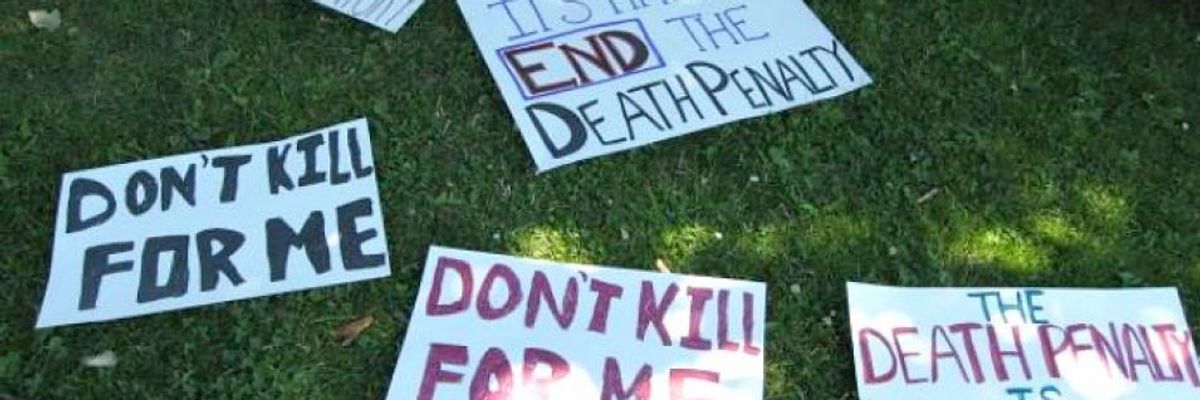Death penalty opponents in Ohio are making last ditch appeals for the state to stop its plan to resume executions after a three-and-a-half-year pause.
The execution of Ronald Phillips is set for Wednesday and would be the first of 27 state-sanctioned killings scheduled through 2021.
The last execution Ohio carried out was that of Dennis McGuire in January 2014. That botched execution was a case of "apparent extreme suffering"--McGuire took 26 minutes to die, snorting and gasping for air.
"Executions have been on hold since because the state had trouble finding new supplies of drugs, and death row inmates challenged Ohio's plans for a new three-drug execution method," the Associated Press writes.
For Phillips's execution, the Toledo Blade reports, the state will use "a new three-drug protocol, a combination it has never used." It will include midazolam, though at a higher amount than was used during McGuire's execution. The executioners will then inject "rocuronium bromide, a paralytic agent designed to shut down respiration, and then potassium chloride to induce cardiac arrest," the Blade writes.
A vigil will take place Tuesday evening outside the Athens County Courthouse, and Amnesty International is encouraging people to tell Gov. John Kasich to halt the executions. "With the state's history of wrongful convictions and botched executions, Ohio must recognize that the death penalty is broken beyond repair," the human rights organization states.
Last week, a diverse group also delivered petitions with 27,000 signatures to Kasich's office calling on him to call off the executions.
"We are not asking the state to turn its back on people who commit serious crimes. We are in favor of hard-life sentences for people who commit despicable crimes, but the death penalty eliminates the possibility we got it wrong," said Pastor Carl Ruby with the Central Christian Church.
Also calling on Kasich to keep the execution moratorium in place are two former Ohio attorneys general--Republican Jim Petro and Democrat Lee Fisher. They wrote last week at Cleveland.com:
The most significant issue is the state's own failure to act on needed changes to the death penalty system. In 2014, the Ohio Supreme Court Joint Task Force on the Administration of Ohio's Death Penalty released a report outlining numerous, systemic problems with the state's capital punishment system, and detailed recommendations to make the system fairer, more reliable, and more just.
[...] Yet none of the most consequential recommendations have so far been adopted, allowing the serious, systemic problems inherent in Ohio's capital punishment laws and practices to continue.
Indeed, that task force's chairman, the now retired Judge James Brogan, said last week: "Those charged with ensuring our capital punishment system is fair and accurate have failed to act."
"More than three years have passed since we issued our report of 56 recommendations yet virtually nothing has changed. This lack of action is disconcerting and will enable the core problems we identified to continue and potentially lead to wrongful death penalty convictions," Brogan added.
Human rights advocates say no amount of tweaking can make the death penalty consistent with humane practices.
Phillips, who was convicted in 1993 of killing and raping three-year-old Sheila Marie Evans, still has two appeals pending.




